Multiple Choice
Identify the
choice that best completes the statement or answers the question.
|
|
|
Ford Travels a Rough
Road
Upon taking office, Gerald R. Ford urged Americans to put the Watergate scandal
behind them. "Our long national nightmare is over," he declared. However, the nation's
nightmarish economy persisted, and Ford's policies offered little relief.
"A FORD, NOT A LINCOLN"
Gerald
Ford seemed to many to be a likable and honest man. Upon becoming vice-president after Spiro
Agnew's resignation, Ford candidly admitted his limitations . "I'm a Ford, not a
Lincoln," he remarked. Raised in Grand Rapids, Michigan, Ford was a product of the nation's
heartland. Some people called him "square," but Ford saw nothing wrong with this. He once
remarked, "It's . . . the straight, the square that accounts for the great stability of our
nation. It's a quality to be proud of." On September 8, 1974, | 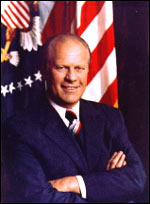
President Gerald
Ford
| | |
|
|
|
1.
|
How did Gerald Ford become
president?
a. | He was elected in
1976 | c. | Nixon resigned when he was vice
predident | b. | He was elected in 1974 | d. | Congress appointed him after Nixon
resigned |
|
|
|
2.
|
Ford became Nixon’s Vvice
President after _____ was forced to resign.
a. | Siro
Agnew | c. | Lincoln | b. | Pat Buchannan | d. | None of these |
|
|
|
3.
|
Gerald Ford gave Richard Nixon
an “full and absolute” pardon over any crimes he may have committed in Watergate. How did
the public respond to this act?
a. | the public approved of
it | c. | there were riots in some American
cities | b. | the public disapproved of it | d. | the public did not react at all |
|
|
|
4.
|
Why did Ford give Nixon a
pardon?
a. | they had a secret
deal | c. | Ford was afraid that he might be
implicated for his role in the Watergate scandle | b. | Ford wanted to get Watergate behind him so the government
could get on to more important matters | d. | Ford did not think that Nixon could be convicted if he went to court and that
would make his administration look bad |
|
|
|
5.
|
The Lincoln is the best car
that the Ford Motor Company makes. The Ford is not as good a car as a Lincoln. What did Ford mean
when he said that he was a Ford not a Lincoln?
a. | he was not as good a president as
Abraham Lincoln | c. | he liked to do
things his own way | b. | he drove a Ford not a Lincoln | d. | he could be just as good a president as
Lincoln |
|
|
|
FORD TRIES TO
"WHIP" INFLATION
By the time Ford took office, America's economy had gone
from bad to worse. Both inflation and unemployment continued to rise. After the massive OPEC
oil-price increases in 1973, gasoline and heating oil costs had soared, pushing inflation from 6
percent to I I percent by the end of 1974. In September 1974, the president invited the nation's
top economic leaders to the White House to discuss economic strategies . In the end, Ford promoted a
program of massive citizen action, called "Whip Inflation Now" or WIN. The president called
on Americans to cut back on their use of oil and gas and to take other energy-saving measures . In
the absence of incentives, though, the plan fell flat. Ford then tried to curb inflation through a
"tight money" policy. He cut government spending and encouraged the Federal Reserve Board
to restrict credit through higher interest rates . These actions triggered the worst economic
recession in 40 years | FORD BATTLES THE CONGRESS
As Ford implemented his economic programs, he continually battled a Democratic Congress
intent on pushing its own economic agenda. The Democrats called for a federal jobs program to bring
down unemployment, which had climbed to 8.5 percent in 1975. Ford rejected the plan, claiming that
pumping more money into the economy would only increase inflation. Throughout his term, Ford vetoed
bills to fund programs for health, education, and housing. During his two years as president, Ford
vetoed more than 50 pieces of legislation.
In the end, Ford's economic policies received
mixed reviews. Inflation had dropped below 10 percent by 1975 and continued to decline slowly.
Unemployment also retreated, but by 1976 it remained stuck at around 8 percent. Ford's policies,
while holding stagflation steady, seemed to offer no lasting
solutions.
| | |
|
|
|
6.
|
Inflation occurs when prices on
goods and services rise. What was a major cause of inflaltion in the mid
70’s?
a. | OPEC raised the price of oil which
raised the price of everything that used oil | c. | OPEC lowered the price of oil which raised the price of everything that used
oil | b. | the farmers started to burn crops because they wanted more money for their
products | d. | none of
these |
|
|
|
7.
|
What is
OPEC?
a. | the United Nations Economic
Councel | c. | an American
company that sets the price of oil for the United States | b. | a group of oil producing nations that join together to set
the price of oil. | d. | greedy American
oilmen |
|
|
|
8.
|
How did Ford encourage
Americans to fight inflation?
a. | cut back on consumption of oil and
gasoline | c. | stop buying houses
and consumer goods | b. | cut back on amount of food consumed | d. | maintain a positive attitude about the economy and the
country |
|
|
|
9.
|
What was the effect of
Ford’s tight money policy to curb inflation
a. | prices
increased | c. | no effect at
all | b. | the overall economy was hurt with a
recession | d. | none of
these |
|
|
|
10.
|
Why did Ford veto so many bills
passed by congress?
a. | congress was controlled by the
Republicans | c. | congress wanted to
pass laws that would put more money in the economy that would increase
inflation | b. | congress was controlled by the Democrats | d. | congress wanted to pass laws that would restrict the flow of money and
increase inflation |
|
|
|
FORD'S FOREIGN
POLICY
Ford fared slightly better in the international arena. With little experience in
diplomacy, he relied heavily on Henry Kissinger, who continued to hold the key position of secretary
of state. Following Kissinger's advice, Ford pushed ahead with Nixon's policy of
negotiation with China and the Soviet Union. In November 1974, he met with Soviet premier Leonid
Brezhnev to plan the next round of arms talks. Less than a year later, he traveled to Helsinki,
Finland, to discuss the future of East-West relations . There, some 35 nations, including the Soviet
Union, signed the so-called Helsinki _ Accords-a series of agreements that promised greater
cooperation between the nations of Eastern and Western Europe .
|
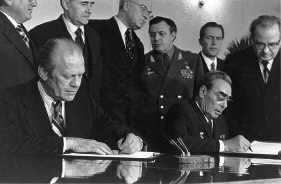 Helsinki Accords Helsinki Accords
“greater cooperation between
the nations of Eastern and Western Europe” .
| | |
|
|
|
11.
|
Which statement is
true?
a. | Ford rejected the Nixon approach to
foreign affairs and started his own programs | c. | Ford rejected the Kissinger approach to foreign
affairs | b. | Ford adopted the Reagan approach to foreign
affairs | d. | Ford continued the Nixon/Kissinger approach to foreign
affairs |
|
|
|
12.
|
What did Ford’s policies
and the signing of the Helsinki Accord do?
a. | increased tensions between the U.S.
and the Soviet Union | c. | made war between
the U.S. and the Soviets more likely | b. | had no effect on East/West relations | d. | reduced tensions betwen the communist nations and the
west |
|
|
|
The Mayaguez incident
Like
presidents before him, Ford encountered trouble in Southeast Asia. In 1975, the Communist government
of Cambodia seized the U.S. merchant ship Mayaguez in the Gulf of Siam. Ford responded with a massive
show of military force. He ordered two air strikes against Cambodia and sent a crack team of U.S .
marines to rescue 39 crew members aboard the ship. The total operation cost the lives of 41 U.S.
troops . Most Americans applauded the action as evidence of the country's strength . However,
critics argued that the mission had cost more lives than it had saved and that the president had
acted without consulting Congress
| | | |
|
|
|
13.
|
What did Gerald Ford prove to
the Nations of Southeast Asia by his actions in the Mayaguez
incident?
a. | that the U.S. victory in Vietnam had
made America strong and rsolute | c. | that the U.S. was not willing to take action to protect its
interests | b. | that the U.S. would take action to protect its interests regardless of what
happended in Vietnam | d. | that the U.S. was weak because of
the Vietnam War (Vietnam Syndrom) |
|
|
|
14.
|
The Mayaguez incident was a _____ the other nations of Southeast Asia and the world
a. | victory
for | c. | warning
to | b. | none of
these | d. | defeat for |
|
|
|
Jimmy Carter
Enters the White House
Gerald Ford won the Republican nomination for president in 1976.
However, he had to fend off a powerful conservative challenge from former California governor Ronald
Reagan . Because the Republicans seemed divided over Ford's leadership, and because Ford's
economic policies had failed to provide substantial relief, the Democrats confidently eyed the White
House. "We could run an aardvark this year and win," predicted one Democratic leader. The
Democratic nominee was indeed a surprise: a nationally unknown peanut farmer and former governor of
Georgia, Jimmy Carter.
THE ELECTION OF 1976
During the post-Watergate era-in
which cynicism toward the Washington establishment ran high-an outsider such as Jimmy Carter proved
to be the right candidate for the time. The soft-spoken man from Plains, Georgia, promised to restore
integrity to the nation's highest office . "I will never tell a lie to the American
people," he said with a distinctive Southern drawl. Throughout the presidential campaign, Carter
and Ford squared off over the key issues of inflation, energy, and unemployment. However, Carter
gained fewer points for his knowledge of economic issues than for his personality and sense of
morality. He openly declared himself a born-again Christian, and he took pride in his pro-civil
rights stance . In addition, Carter had a warm, direct campaign style. He would walk up to a stranger
on the street, smile, and stick out his hand. "Hello, I'm Jimmy Carter and I'm running
for president," he'd say. "I'd like your vote ." | 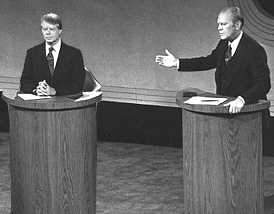 The Carter - Ford Debate in
1976 The Carter - Ford Debate in
1976
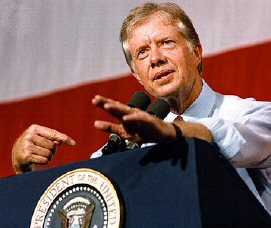
President Jimmy Carter
Ford began the 1976 campaign well behind Carter in the
polls. Although he narrowed the gap by election day, he could not close it. Jimmy Carter won a close
election, claiming 40.8 million popular votes to Ford's 39.1 million. | | |
|
|
|
15.
|
In the 1976 election there was
a split in the Republican party between the supporters of President Ford and the supporters of _____
a. | Jimmy
Carter | c. | Ronald
Reagan | b. | George Bush | d. | Richard Nixon |
|
|
|
16.
|
Why did the people of the
United States like Jimmy Carter in 76?
a. | he was a simple, honest man from
outside the Washington political scene | d. | all of these | b. | people were tired of the corruption inside
Washington | e. | none of
these | c. | people did not look at Carter as a
politician |
|
|
|
GEORGIA COMES TO WASHINGTON
From the very beginning, the new first family brought a down-to-earth style to Washington
. Refusing the traditional limousine ride after his inauguration, Carter walked with his wife,
Rosalynn, and daughter, Amy, down Pennsylvania Avenue to the White House. After settling into office,
Carter stayed in touch with the people by holding Roosevelt-like "fireside chats" on radio
and television . He also held "phone-ins" so that people could talk directly with their
president.
However, Carter failed to reach out to Congress in a similar way. Because he
had run as an outsider, Carter refused to play the "insider" game of compromise and deal
making . Relying mainly on a team of advisers from Georgia, Carter even alienated himself from
congressional members of his own party. Democrats on Capitol Hill often joined Republicans to sink
the president's budget proposals, as well as his ambitious legislative agenda, which included
major reforms of tax and welfare systems.
| 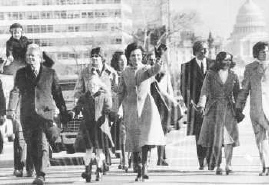
Carter and Family walk to the White
House
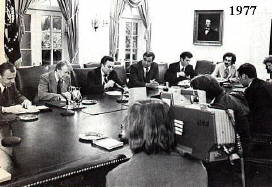 Carter White House
Staff Carter White House
Staff | | |
|
|
|
17.
|
Jimmy Carter tried to portray
himself as
a. | a simple man of the
people | d. | a New England Liberal
Elite | b. | an imperial president | e. | a Southern Liberal Elite | c. | a sophisticated
intellectual |
|
|
|
18.
|
Which statement is true about
the Carter administration.
a. | they did not build good relations
with congress so they had trouble getting their laws passed | c. | the team Carter brought with him from Georgia were good at
getting things done in Washington | b. | they built good relations but could not get their laws passed because he was a
southerner | d. | none of these are
true |
|
|
|
Carter's Domestic
Agenda
Like Gerald Ford, President Carter focused much of his attention domestically on
battling the country's energy and economic crises . While he met with some successes, Carter
could not bring the United States out of its economic downswing.
CONFRONTING THE ENERGY
CRISIS
Carter considered the energy crisis to be the single most important issue facing
the nation . A large part of the problem, the president believed, was America's over reliance on
imported oil. On April 18, 1977, Carter sat before the nation and in a fireside chat urged his
fellow Americans to cut their consumption of oil and gas Carter asked Americans to turn down their
thermostats to 65 degrees in the day and 55 degrees at night. He proposed a cabinet-level Department
of Energy and presented Congress with more than 100 proposals on energy conservation and development.
The battle over the president's energy policy started almost immediately. Representatives from
oil- and gas-producing states fiercely resisted some of the proposals. Automobile manufacturers also
lobbied against gas-rationing provisions. "It was impossible for me to imagine the bloody
legislative battles we would have to win,- Carter later wrote.
Out of the battle came the
National Energy Act The act placed a tax on gas-guzzling cars, removed price controls on oil
and natural gas, produced in the United States,
|
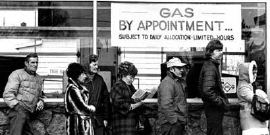
People line up to make an appointment to
buy gas
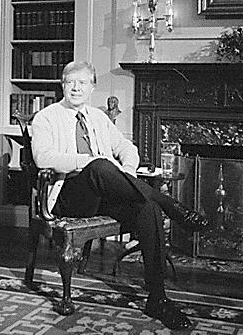
President Carter talks to the nation
about the energy crisis
| |
and extended tax credits for the development of alternative energy supplies. By 1979, U.S .
dependence on foreign oil had eased slightly. Private industry did its part by developing more
gas-efficient automobiles and home heating systems. In addition, American citizens helped by lowering
their thermostats and reinsulating their homes. A few also took advantage of a tax credit to install
solar-heating panels | | |
|
|
|
19.
|
Which statement is
true?
a. | Carter used the fireside chat to
urge Americans to cut their consumption of energy as a way of fighting the energy
crisis | d. | all of these statements are
true | b. | Carter urged individual Americans to take part in the conservation of energy
by doing things like; lowering heat in their homes and turning off
lights | e. | none of these statements are
true | c. | Carter believed that a central energy problem was America’s
over-dependance on foreigh oil |
|
|
|
20.
|
Which item below did the
National Energy Act not
do?
a. | Put a tax on large cars that
consumed lots of gasoline. If people bought fewer large cars they would consume less
gas | c. | Removed controls on the price of
American oil and gas so the price could rise. If gas and oil cost more, Americans would consume
less. | b. | Encouraged Americans to travel more in the U.S. so they would use more
American gasoline and less foreign gasoline |
|
|
|
THE ECONOMIC CRISIS WORSENS
Unfortunately, these
energy saving measures could do little to combat a sudden new economic crisis . In the summer of
1979, renewed violence in the Middle East produced a second major fuel shortage in the United States
. To make matters worse, OPEC announced another major price hike. In 1979 inflation soared from 7.6
percent to 11 .3 percent.
Faced with increasing pressure to act, Carter attempted an array of
measures. He implemented voluntary wage and price freezes to slow inflation. He also tried to reduce
the national debt through spending cuts. To stimulate business, Carter deregulated, or lifted
government controls from, trucking, railroad, and shipping industries . To reduce the money supply,
he convinced the Federal Reserve to raise interest rates. None of these measures worked. Worse yet,
Carter's scattershot approach convinced many people that he had no economic policy at all.
Carter fueled this feeling of uncertainty by delivering his now famous "malaise" speech, in
which he complained of a "crisis of confidence" that had struck "at the very heart and
soul of our national will ."
Carter's address made many Americans feel that their
president had given up. By 1980, inflation had climbed to nearly 14 percent, the highest rate since
1947. The standard of living in the United States slipped from first place to fifth place in the
world. Carter's popularity slipped along with it . Polls put his approval rating at a dismal 26
percent, lower than Richard Nixon's lowest figures. The fact that this economic downswing-and
Carter's inability to solve it-visited the nation during an election year was one of the key
factors in sending Ronald Reagan to the White House.
|
|
|
21.
|
Why would a crisis in the
Middle East provoke a feul shortage in the United States?
a. | The U.S. needed oil to prepare for a
possible war with the Soviet Union | c. | The U.S. got much of its oil from the middle
east | b. | A crisis in the middle east could not provoke fuel shorages in the
U.S. | d. | The U.S. had to supply a great deal of oil to
Israel |
|
|
|
22.
|
Inflation is a rise in prices
that hurt everyone in the economy. Most of the actions that Carter took were designed to ______ so
prices would fall.
a. | reduce the amount of money in
circulation | c. | increase wages and
prices | b. | increase the amount of money in circulation | d. | increase unemployment |
|
|
|
23.
|
Which statement is
true?
a. | Under Jimmy Carter the economy of
the United States improved | c. | Under Jimmy Carty the economy of the United States declined and the standard
of living declined also | b. | Under Jimmy Carter the economy of the United States declined but the standard
of living rose | d. | President Carter had a strong
economic plan that improved the American economy |
|
|
|
24.
|
President Carter had to face
Ronald Reagan in the 1980 election. The economy _____ President Carter’s chances of
victory.
a. | helped | c. | had no effect on | b. | hurt |
|
|
|
A CHANGING ECONOMY
Many of the economic
problems Jimmy Carter struggled with resulted from long-term trends in the economy. Since the 1950s,
the rise of automation and foreign competition had reduced the number of manufacturing jobs. At the
same time, the service sector of the economy expanded rapidly. This sector includes industries such
as communications, transportation, and retail trade. During the 1970s, the shift toward a
service-based economy accelerated, spurred on by the development of the tiny microchip that enabled
computers to be cheaply mass-produced.The rise of the service sector and the decline of manufacturing
jobs meant big changes for some American workers. Workers left out of the shrinking pool of
manufacturing jobs faced an increasingly complex job market. Many of the higher-paying service jobs
required more education or specialized skills than did manufacturing jobs. The lower-skilled service
jobs usually did not pay well.
Growing overseas competition during the 1970s caused
further change in America's economy. The booming economies of West Germany and countries on the
Pacific Rim (such as Japan, Taiwan, and Korea) cut into many U.S. markets. Many of the nation's
primary industries-iron and steel, rubber, clothing, automobiles- had to cut back production, lay off
workers, and even close plants .
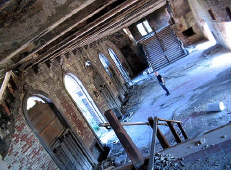 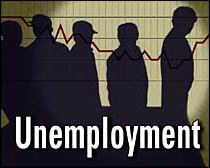
|
|
|
25.
|
A manufacturing economy is
based on manufacturing products like steel, clothing and electronics. A service economy is based on
providing services such as computer information processing, and telecommunications. In the
1970’s the U.S. began to shift from a _____ economy to a _____ economy
a. | service -
manufacturing | c. | manufacturing -
service | b. | service - computer | d. | none of these |
|
|
|
26.
|
As thosands of industries shut
down and manufacturing plants closed, a wide area of the northeast United States became known as
the
a. | frost
belt | c. | farm
belt | b. | rust belt | d. | silicon valley |
|
|
|
27.
|
The old manufacturing jobs of
the northeast and central United States were usually high paying union jobs. Also, energy costs were
high in this area because energy plants also hired union workers. What happened to these jobs in the
70’s
a. | most jobs were saved because of the
use of technology and computers | c. | union jobs were lost as factories moved south, west and to foreign countries
where they did not have to pay union wages | b. | all of these are true | d. | most were saved as factories put in place better
machinery |
|
|
|
28.
|
The higher paying service jobs
of the new economy required
a. | lower skills than the average
industrial worker. | c. | no more education
and trainging than the average industrial worker had | b. | the same skills as lower service industries such as clerk
and restaurant worker | d. | more education and trainging than
the average industrial worker had |
|
|
|
29.
|
The rise in unemployment, the
loss of manufacturing jobs and the loss of industries to foreign countries
a. | hurt people who lived in the cities
especially hard | c. | did not effect
minorities | b. | did not effect people who lived in the
cities | d. | had little effect on the people of the
northeast |
|